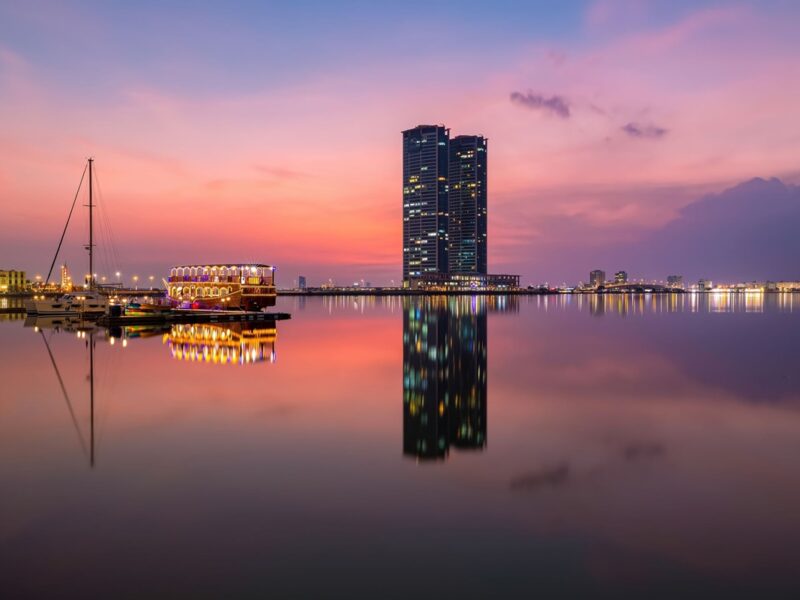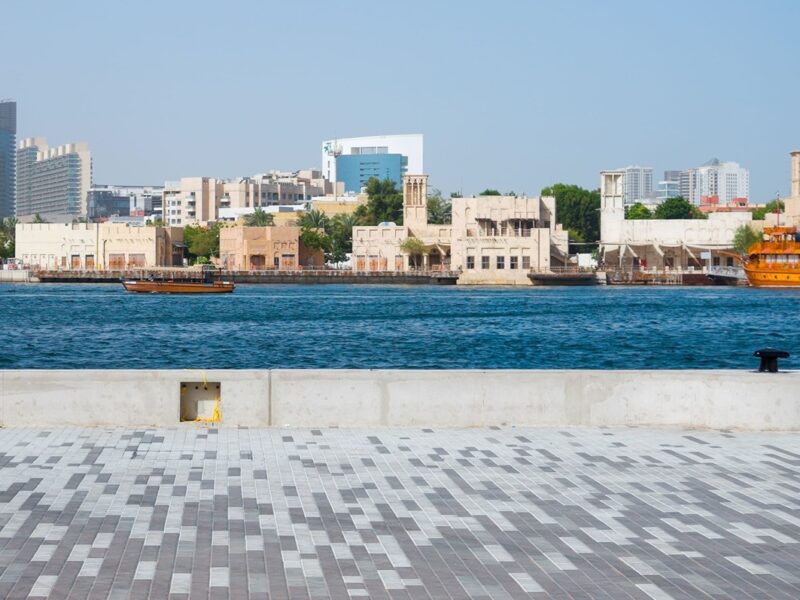“I may seem calm but I always have a hundred things going on in my head,” says Advet Bhambhani, the 35-year-old founder and chairman of Advet Bhambhani Ventures (ABV).
It is true – Bhambhani does look calm, swathed as he is in the plush surroundings of the Four Seasons hotel in Dubai.
But behind the cool exterior, the Indian-born, Dubai-based billionaire is keyed up, fretting in particular over his public appearance.
In the run-up to this interview, he has demanded elaborate photoshoots in upmarket locations and when those requests were not met, complained that the shoot on offer would only present him in one outfit.
All this concern comes on top of juggling five groups of companies spanning healthcare, real estate and hospitality, while conjuring up a string of new business ventures, helping to curate the Short+Sweet Theatre Festival in Dubai, sifting through film scripts with an eye to producing his second feature film, and, last but not least, spending time with his wife and three children.
It is no wonder he orders a strong mochaccino as we sit down to our interview at five o’clock on a Thursday afternoon.
“All of my ventures are a reflection of my personality, my desire to innovate,” he says. “I am driven by success, and I have never found any gratification in cookie-cutter business models. I like to do things differently.”
One of the things he wants to do differently is healthcare. ABV’s flagship holding company Lifeline Healthcare represents UAE-based brands including Lifeline Hospitals, Lifeline Medical Centres, Lifeline Express Clinics, DUA Clinics, 800 Doctor and ION Pharmacies. With nine medical centres and three hospitals in the UAE, the company aims to expand in Oman, Qatar and eventually further across the Gulf. The group also has the first mobile healthcare service in the UAE and the largest private ambulance fleet in Dubai.
It recorded 32 percent year-on-year growth over the 12 months to January 2016, says Bhambhani, and is targeting continued exponential growth in the coming years in line with increased demand for healthcare provision in the GCC as low oil prices squeeze government budgets and dips service quality.

ABV’s new venture, Nucleus Hospitals, would treat patients like guests.
There are ample opportunities in the conventional healthcare sector: demand for hospital beds in the GCC is expected to rise by almost 3 percent each year until 2020 yet hospital bed density in the region, at 17 beds per 10,000 people, lags behind the global average of 27 per 10,000, according to a report by Alpen Capital published in February.
However, Bhambhani is restless and wants to create a new niche. He has set himself the task of establishing the first luxury hospital chain in the Middle East and India. Under a new division of ABV called Nucleus Hospitals, Bhambani plans to open five ‘boutique hospitals’ in the Gulf and India by 2020, starting with one in Mumbai for which plans were unveiled last year, and one in Dubai, which has gone unannounced until now.
Outlining his vision, Bhambhani says the concept underpinning the new chain is exclusive hospitality connected with quality healthcare provision: “Think luxury suites, best-in-class concierge and dining and a personalised limousine service to and from the hospital”. There would be no shared beds, rooms or wards; instead, patients would be offered tailor-made spa treatments and other ‘wellness’ packages to aid their recovery. Each hospital would be partnered with a world-class hotel operator– discussions with interested parties are ongoing, Bhambhani claims – and there would be no such thing as a waiting room or queues.
“Hospitals are typically such sterile places,” he laments. “People have recollections of them as being unwelcoming places associated with illness, pain and suffering. This does not have to be the case. What we are going to create will be game-changing.”
Under the plans, Nucleus-branded hospitals would be ‘tertiary care’ facilities, capable of performing major operations such as open heart surgery, and treating emergency head and other injuries. However, Bhambhani says they would also undertake cosmetic surgery and other non-disease-related procedures.
“We want to be the pioneer in luxury healthcare. The aim is that, on the face of it, nothing about these hospitals would resemble an actual hospital. The brief we have given to our architects is to design a hotel, but to incorporate elements of a hospital – of course the surgery rooms and so on. But we want to conceal these elements as much as possible.”
Under initial plans, the first Nucleus luxury hospital was to open in Mumbai in 2017 in an attempt to capitalise on India’s lucrative private healthcare sector and medical tourism industry. But Bhambhani says 2017 is looking increasingly unlikely. “[Doing business in] India is very different from doing business in advanced economies and we have struggled with the bureaucracy – in particular, regulations around planning, licensing and healthcare.
“If India wants to open up to higher levels of foreign direct investment and compete with emerging economies such as China and Africa – which it has stated it does – it will need to up its game. Right now there are so many variables. We have made good progress with our plans, but it is no advantage being an Indian national.”
While work continues to overcome legislative barriers to building a hospital in India, Bhambhani is escalating more recent plans to establish the Nucleus chain in Dubai. He says he has acquired a one-acre plot of land just off the Sheikh Mohammed Bin Zayed Road in Mirdif, near Dubai International Airport, and construction of the region’s first luxury hospital is expected to commence this year.

Lifeline Healthcare spans hospitals, medical centres, clinics and pharmacies.
The hospital will have 150 beds, making it three times the size of the proposed Mumbai scheme. There will be a piano player as you walk in, Bhambhani says, as well as a welcome drink and private suites – all the things you expect from a five-star hotel. He will not be drawn on the pricing structure, saying only that it will “not be above the cost of the highest level accommodations at existing private hospitals in the UAE”.
The location in Mirdif was selected for its proximity to the airport, enabling the company to cash in on inbound medical tourism to the UAE; its strong, residential community vibe and reasonable land prices when compared to other parts of the emirate. “We want to create a destination people will seek out once they know about it,” he says. The scheme is intended to be built by 2018, probably before the one in India.
ABV’s healthcare pioneering does not stop with the luxury hospital chain. Bhambhani reveals he has acquired a second plot of land in Dubai on which he plans to build the first privately-funded critical care hospital in the UAE.
“There is no private sector intensive care unit in Dubai at present,” he states. “There is only the state-run Rashid Hospital, which is almost permanently full. There is a lot of opportunity in the critical care sector – we are talking coma cases, people in persistent vegetative states, complex long-term medical situations that require specialised resources and place a large burden on government.”
Bhambhani anticipates that this hospital will be primarily a B2B venture as “most of the patients concerned are not able to make a decision about their treatment”. So the new hospital– to be called Criticare – will liaise with other hospitals across the UAE and step in to relocate patients when those facilities are unable to provide the necessary resources to look after them.
Bhambhani says he has acquired a third plot of land for what will be the first custom-built paediatrics hospital in Dubai. It will be a children’s hospital with a maternity ward and designed “in a totally different way from other such hospitals elsewhere in the world”, he says. “We have told the architects we want people to walk into a calm yet playful atmosphere. The building could be designed in the shape of a bouncy castle, or a large playground –we don’t want it to feel like a hospital.”
These three ventures are projected to be operational by 2020 and together cost in the region of $600m including land acquisition, Bhambani says. An estimated 30 percent of the cost will come from “internal accruals in ABV’s corporate accounts” while 70 percent will be debt-funded; ABV is in talks with banks to secure the requisite financing. Bhambani says he is not concerned about the low liquidity in the market at present: “People [and banks] are very bullish on healthcare. It is a defensive sector that continually performs well on the Dubai Financial Market and we are confident we will secure the funding we need.”
The ultimate aim is to franchise all three business models across the rest of the Gulf, but Bhambhani has one final plan up his sleeve that he wants to share with Arabian Business –that is to build the UAE’s first dedicated care home for the elderly, for which he is actively seeking a plot of land.
But when national visa regulations prohibit expats from retiring in the UAE and Emirati cultural traditions demand younger generations look after their elders, it begs the question: is there demand for such a business? Bhambhani is adamant that the demographic of older Emiratis is significant.

Patient rooms at Nucleus Hospitals would resemble hotel rooms.
“We understand there to be a sizeable geriatric population suffering from incurable diseases such as Parkinson’s and Alzheimer’s,” he says. “Caring for sufferers of these conditions puts a huge strain on the younger generation – particularly if they have their own offspring to look after. And even if it is not a huge market, if you are the only company catering to it, you will still reap returns.”
Bhambhani was born in Jaipur and spent the first three years of his life in Mumbai before his family moved to Dubai, where his father was a specialist trauma surgeon at Rashid Hospital for 15 years until the early 1990s. He recalls developing an early interest in healthcare – for example, spending hours reading his father’s medicine books as a child. But while Bhambhani senior had little interest in the business side of healthcare, his son says he opted not to become a doctor himself, instead reading engineering, business administration and hospital management at Purdue University in Indiana.
He spent a decade in the US in total, “until the dotcom bubble burst, 9/11 [happened], then the Republicans got in and I felt things were going to be very tough in the States in the coming years”. At around that time, in 2001, the UAE government enacted new laws on freehold land ownership making it easier for foreigners to invest. Bhambhani says he took the decision to return to Dubai and build up Lifeline Healthcare, the company his father had founded, at his son’s request, to fund his education in the States but which had been operating at roughly the same size for most of the previous decade.
“Really he (his father) had not done anything with [the company] since we set it up, literally everything was done by me. So I came in and started expanding it and it’s grown from there.”
ABV’s other holding companies – Constellation Communications & Events, Delish Hospitality and Conjure Realty – have also been growing steadily in recent years, though not as markedly as the healthcare businesses. Conjure Realty has been amassing a land bank in India over the past year and Bhambhani is aiming to increase it from the current 900 acres to 5,000 acres and then develop the land in collaboration with a real estate partner. There are no plans to amass a similar portfolio in Dubai, he says.
Bhambhani is also investing in building a new 300-to-500-seat theatre in Dubai to stage productions and support the local theatrical community. He has produced his first film, ‘Angry Indian Goddess’, screened at the Toronto Film Festival last year, and says he reads at least one script per month to try to identify the basis for a second movie production. “For me, it’s all about facilitating talent,” he says. Meanwhile, 5 percent of ABV’s profits go towards projects undertaken by the Advet Bhambhani Foundation, a charity that operates mobile clinics that provide basic healthcare services to impoverished communities in India.
It is an exhaustive list of pies to have your fingers in, but Bhambhani seems relatively unfazed. He is motivated by a desire to be the driving force behind a multitude of ventures, he explains. The only industry in which he says he has no interest at all is retail. “The retail sector does not excite me, particularly here in the Middle East where it is mostly about franchising.
“Don’t get me wrong, I don’t have a problem with franchising per se, but it doesn’t allow for creativity. I want to be the licensor, not the licensee.”
And so, that is how Advet Bhambhani does business.










